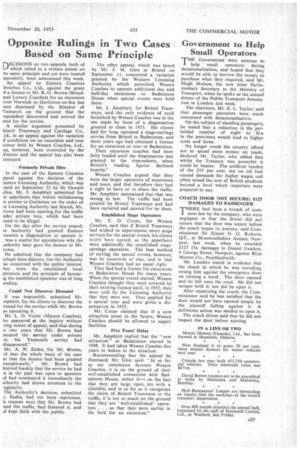Opposite Rulings in Two Cases Based on Same Principle
Page 29

If you've noticed an error in this article please click here to report it so we can fix it.
DECIS1ONS on two appeals, both of which relied to a certain extent on he same principle and yet were treated ippositely, were announced this week. An appeal by Eastern Counties 3mnibus Co., Ltd., against the grant A a licence to Mr. R. G. Brown (Broadand Luxury Coaches) for an excursion rom Norwich to Gorleston-on-Sea has ieen dismissed by the Minister of Transport on the ground that the espondent discovered and proved the teed for the service.
A similar argument presented by Iristol Tramways and Carriage Co., Ad., in an appeal against the variation if conditions on an excursion and tour icence held by Wessex Coaches, Ltd., as, however, been overruled by the dinister and the appeal has also been ismissed.
Formerly Private Hire In the case of the Eastern Counties ppeal against the decision of the astern Licensing Authority, which was eard on September 22 by Sir Oswald ilk°, Mr. J. Amphlett submitted for ie appellants that before withdrawing is service to Gorleston on the order of le Licensing Authority last March, Mr. ;rown had been catering for the traffic nder private hire, which had been mind to be illegal.
On the day after the service ceased, ie Authority had granted Eastern 'ounties a dispensation to operate it. : was a matter for speculation why the ,uthority later gave the licence to Mr. rown.
He admitted that the company had erhaps been dilatory, but the Authority as concerned with the public interest. hey were the established local aerators, and the principle of favourig the established operator was of long anding.
Could Not Discover Demand It was impossible, submitted Mr. mphlett, for his clients to discover the ;mand for the service while Mr. Brown as operating it.
Mr. L. 0. Votier (Mascot Coaches), ho appeared at the inquiry without ving notice of appeal, said that during Le two years that Mr. Brown had aerated the service under private re, -his Yarmouth service had disappeared."
Mr. A. W. Eades, for Mr. Brown, id that the whole basis of his case as that the licence had been granted exceptionally." Mr. Brown had !mined frankly that the service he had n in the past was open to question id had terminated it immediately the uthority had drawn attention to the :egularity.
The Authority's decision, submitted r. Eades, had not been capricious. is reasons were that Mr. Brown had und the traffic, had fostered it, and xl kept faith with the public.
The other appeal, which was heard by Mr. J. M. Glen at Bristol on September 11, concerned a variation granted by the Western Licensing Authority which permitted Wessex Coaches to operate additional day and half-day excursions to Badminton House when special. events were held there.
Mr. J. Amphlett, for Bristol Tramways, said the only evidence of need furnished by Wessex Coaches was in the use made by them of a dispensation granted to them in 1953. His clients had for long operated a stage-carriage 'service from Bristol to Badminton, and three years ago had obtained a licence for an excursion or tour to Badminton.
Their excursion coaches had been fully loaded until the dispensation was granted to the respondents, when Bristol's loading figures declined heavily:" Wessex Coaches argued that they were the larger operators of excursions and tours, and that therefore they had a right to have or to share the traffic. Mr. Amphlett maintained that that was wrong in law. The traffic had been created by Bristol Tramways and had been nurtured and catered for by them.
Established Stage Operators Mr. T. D. Corpe, for Wessex Coaches, said that if Bristol Tramways had wished to superimpose more stage services for the special events, his clients might have agreed, as the appellants were admittedly the established stagecarriage operators. The• best method of serving the special events, however, was by excursion or tour, and in that Wessex Coaches had an equal right.
They had had a licence for excursions to Badminton House for many. years. When the special events started, Wessex Coaches thought they were covered by their existing licence until, in 1952, they were told by the Licensing Authority that they were not. They applied for a special tour and were given a dispensation in 1953.
Mr. Corpe claimed that if a new attraction arose in the future, Wessex Coaches should be allowed to supply facilities.
Five Yea& Delay Mr. Amphlett replied that the "new attraction" at Badminton started in 1948. It had taken Wessex Coaches five years to waken to the situation.
Recommending that the appeal be dismissed, Mr. Glen said; "In so far as my conclusion favours Wessex Coaches, it is on the ground of their well-established connection with Bad minton House, rather on the fact that they are large open, ors with a clientele; and in so far as it recognizes the claim of Bristol Tramways to the traffic, it not so much on the ground that they are well-established' opera tors . . as that they were earlier in the field for an excursion."




















































































